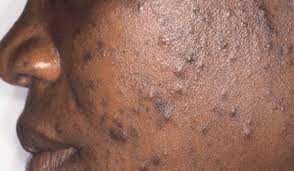Natural remedies for acne

Natural remedies for acne
An estimated 85% of young adults worldwide suffer from acne, one of the most prevalent skin diseases.
Although traditional acne treatments like salicylic acid, niacinamide, and benzoyl peroxide have been shown to be the most successful, they can be costly and have unfavorable side effects including dryness, redness, and irritation.
Many people have been motivated by this to explore home remedies for acne. According to a 2017 survey, 77 percent of acne sufferers had attempted non-prescription acne treatments.
There has to be more research on the efficacy of many home cures because they are not supported by science. However, if you’re looking for alternative therapies, your options remain.
This article looks at 14 well-liked home treatments for acne.
What then is acne?
When your skin follicles are clogged with oil and dead skin cells, acne develops as a skin disorder. Acne is a very common condition, and the majority of individuals have had it at some point in their lives, particularly when they were teenagers and their sebaceous glands were producing more oil.
Adult acne, on the other hand, has no age restrictions and is common in persons in their 40s and 50s.
What brings on acne?
When your skin’s pores become blocked with oil and dead skin cells, acne develops.
Each pore is associated with a sebaceous gland, which creates sebum, an oily material. Propionibacterium acnes, often known as P. acnes, can develop more rapidly when excess sebum clogs pores.
P. acnes is attacked by your white blood cells, causing skin irritation and acne. Although some cases of acne are more severe than others, whiteheads, blackheads, and pimples are common signs of the condition.
Genetics, food, stress, hormonal fluctuations, and infections are just a few of the many potential causes of acne.
The best clinically proven methods for decreasing acne are standard treatments. You can also attempt at-home remedies, though further study is required to determine their efficacy.
Here are some natural remedies for acne.
Natural remedies for acne
- Put apple cider vinegar on
The advantages of utilizing this include its affordability, accessibility, and ability to make acne scars look less noticeable. However, the skin may get irritated.
The unfiltered juice from crushed apples, or apple cider, is fermented to produce apple cider vinegar.
Research has shown that it has the same antibacterial properties as other vinegar.
Citric acid is one of the organic acids found in apple cider vinegar. Citric acid and zinc oxide have been reported to kill P. acnes, according to research.
The lactic acid in apple cider vinegar, according to research from 2017, may also lessen the visibility of acne scars.
There is currently no evidence to support the use of apple cider vinegar for treating acne, while some of its ingredients may be helpful in this regard. Because it could irritate the skin, some dermatologists advise avoiding using apple cider vinegar at all.
How to use vinegar to treat acne
- Combine 3 parts water and 1 part apple cider vinegar (use more water for sensitive skin).
- Use a cotton ball to gently apply the mixture to the skin after cleaning.
- After 5 to 20 seconds, rinse it with water, then pat it dry.
- As necessary, repeat this procedure 1–2 times daily.
- The use of apple cider vinegar on the skin should be avoided since it might irritate and burn the skin, according to the majority of dermatologists.
- If you decide to give it a try, use it sparingly and diluted it with water.
Natural remedies for acne
- Add zinc supplement to your diet
The advantages of this approach are that it is backed by scientific research and offers a wide range of advantages. The cons include the possibility of stomach or gut irritation and the fact that topically applied dosages are ineffective.
Zinc is a crucial vitamin for immune system health, hormone production, cell growth, and metabolism.
Compared to other acne-related natural remedies, it has undergone a fair amount of research.
In comparison to those who weren’t treated with zinc, those who were showed significant improvements in the number of inflammatory blemishes, per a 2020 meta-analysis.
The safe upper limit for daily zinc intake is 40 milligrams, so it’s usually advisable to stay within that level unless you’re under a doctor’s care.
Taking too much zinc might have negative effects, such as gastrointestinal discomfort.
It’s also crucial to remember that there is no evidence to support the effectiveness of applying zinc to the skin. This might be a result of zinc’s poor skin absorption.
- Make a mask with honey and cinnamon.
Its antimicrobial properties and simplicity of production are advantages. But there isn’t enough evidence to support the assertions.
According to a 2017 study, P. acnes was resistant to the antibacterial activities of honey and cinnamon bark extract.
According to research published in 2020, honey can either prevent P. acnes from growing or actually destroy it. However, this discovery does not imply that using honey to treat acne is always successful.
Natural remedies for acne
According to a 2016 study involving 136 acne sufferers, using antibacterial soap alone was just as helpful as treating acne as using honey afterward.
While honey and cinnamon’s anti-inflammatory and antibacterial qualities may lessen acne, additional research is required.
How to use it
- Make a paste by combining 2 tablespoons of honey and 1 teaspoon of cinnamon.
- Apply the mask on your face after cleansing, and keep it on for 10 to 15 minutes.
- Completely rinse the mask off, then pat your face dry.
SEE ALSO: Dangerous side effects of eating too much bread
- Spot treat with tea tree oil
The leaves of the little Australian native tree Melaleuca alternifolia are used to make tea tree oil, an essential oil.
According to a 2018 study, using tea tree oil to the skin may help with acne.
A tiny 2019 study indicated that participants using a tea tree oil treatment for acne noticed less dry skin and discomfort when compared to benzoyl peroxide. They were happier with the therapy overall as well.
In accordance with a 2017 study, topical and oral antibiotics that may promote bacterial resistance if taken repeatedly can be effectively replaced by tea tree oil.
- Apply green tea to your skin
Drinking green tea can help you stay healthy because it contains a lot of antioxidants. Additionally, it might lessen acne.
This is most likely because green tea’s polyphenols kill germs and lessen inflammation, which are the two primary causes of acne, according to 2017 research.
Natural remedies for acne
Research on the advantages of drinking green tea for treating acne is lacking, and more research is required.
80 women were administered 1,500 mg of green tea extract every day for 4 weeks as part of a modest 2016 trial. Women who took the extract had reduced acne on their noses, chins, and mouth areas towards the end of the research.
When to see a doctor
People with moderate to severe acne should seek professional help to find relief. Prescription-strength acne treatments are available.
It may be time to seek professional help from a dermatologist if you:
- tried everything and nothing seems to help
- have recurring breakouts that clear up and return
- get acne in places like your thighs or upper arms
- have acne that’s painful and deep under the skin
- have breakouts that have been going on for years
- have acne that affects your confidence, self-esteem, and social life
- think your acne may be linked to a new medication you’re on
- have acne that leaves dark spots
- Even if you have a mild case of acne, it may be helpful to visit a doctor regularly to see how
- your skin progresses with treatment
ALSO READ: University of Ghana: Take Note Of This When Paying Your Fees


 Civil Service Announces 2024 Online Examination Details for Graduate Applicants
Civil Service Announces 2024 Online Examination Details for Graduate Applicants  BREAKING: President Biden Announces Decision Not to Seek Reelection
BREAKING: President Biden Announces Decision Not to Seek Reelection  Real Reason Behind the Appointment of Yohunu as Deputy IGP
Real Reason Behind the Appointment of Yohunu as Deputy IGP  GES 2024-2025 Academic Calendar for Public Schools
GES 2024-2025 Academic Calendar for Public Schools  GES to recruit university graduates and diploma holders-GES Director General
GES to recruit university graduates and diploma holders-GES Director General  Dr. Bawumia’s Smart Phone Credit Will Take 125 Years To Repay: A Misleading Promise
Dr. Bawumia’s Smart Phone Credit Will Take 125 Years To Repay: A Misleading Promise  GES is expected to announce reopening dates for public schools today
GES is expected to announce reopening dates for public schools today